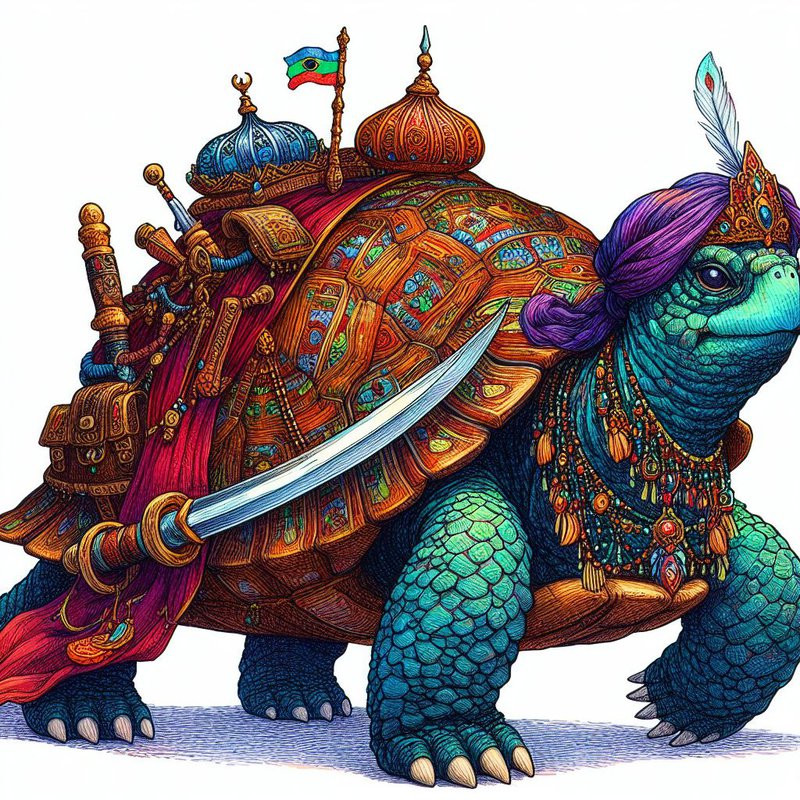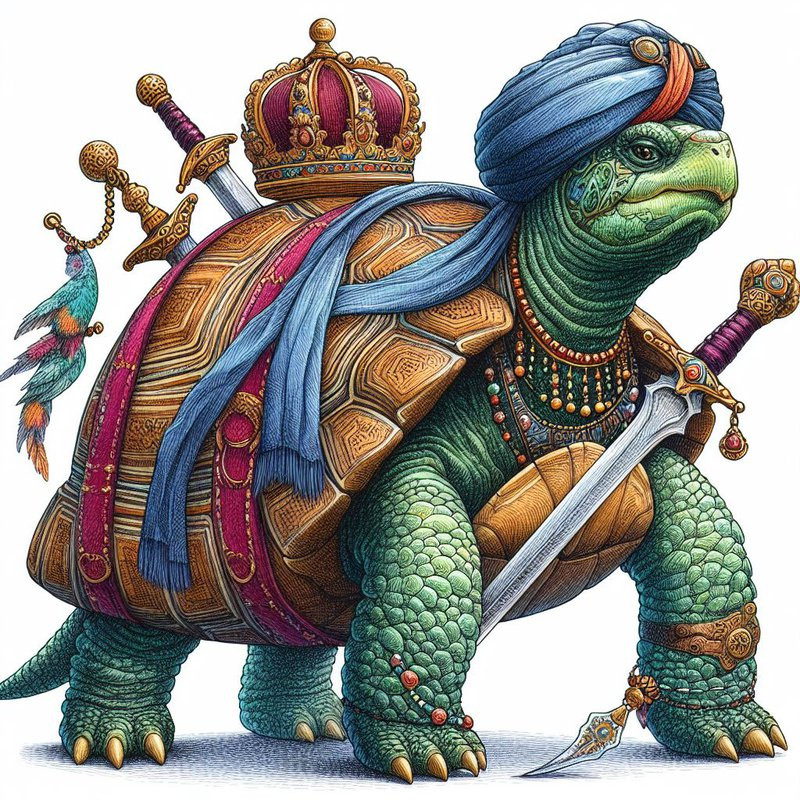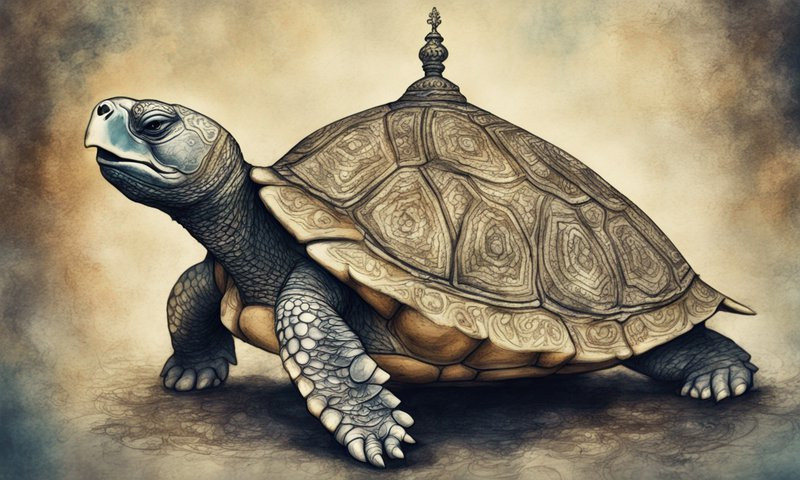In his translation of The Dravidian Nights Entertainment, Natesa Sastri translated two stories of the turtle (tortoise) prince. In the first one, titled Faith is always rewarded, King Venkataja, from the city of Mallikârjunapurî, is married to a first wife who hasn't born him a son. So he divorces her, places the former queen in a separate pavilion next to the palace, and marries a second time. The new queen also does not bear him children. The King searches for illumination, and Mahêsvara and the Sûlapânin Isa help him by giving him a magical mango-fruit that shall help the new queen. The servants press the mango and prepare a juice for her to drink. As for the mango seed, the first queen's servant takes it and gives her. The queen breaks a portion of the seed and gives to her maid. The second queen gives birth to twin boys, the maid to a son and the first queen to a tortoise. The narrative says that the tortoise son was no ordinary turtle, but a beautiful prince born of Paramêsvara's favour.
The first queen feeds the tortoise. One night, the tortoise moves toward his mother's plate of rice, takes off its shell and becomes a boy. He eats the rice and hides again under the tortoise shell. The mother notices the missing food and suspects the maidservant, but decides to investigate further: that night, she pretends to be asleep, and sees the tortoise moving towards the bowl of rice, taking off its shell and becoming a human boy. The queen smashes the shell. When the boy tries to find it, he sees the shell has been destroyed. He wakes his mother and explains that he needed the shell for some more time before he revealed himself truly. He then says he will paint himself with soot and charcoal and asks his mother to hide him in a box. God Parmêsvara instructs sages and learned men to go to the city to teach the prince in the box.

Some time later, the king instructs his twin sons to go up north, to the furthest mountain, Himayagiri ("the frosty mountain"), and get a princess as their father's third wife. Meanwhile, their half-brother, the tortoise prince, using his gift of Jñanâdrishti (a sort of cosmic awareness or omniscience), learns of the quest and knows their endeavor will fail if he does not go with them. He puts some more charcoal on his skin and accompanies the twin princes. They reach a red-coloured stream and think of drinking the water, but the prince knows that the stream was the refuse water from the princess's bath. So he takes his two half-brothers, one on each arm, and leaps from one margin to the other. The princess sees the event, for she has declared she will marry the man who can cross the stream. The princess tells her father of the incident and to prepare her marriage to the extraordinary man. The man agrees, with the condition that he still wears the black soot on the ceremony. They marry, and the man reveals to his wife his royal origins, and advises her that she should come to Himayagiri should he not returns in 28 days' time.
The tortoise prince (in his disguise) and the twins princes continue their journey. In another city, a similar marriage test is imposed on the princess's potential suitor: a peon on the city entrance gives a pie for travellers and says they must find firewood, leaf and oil, and return the pie. The prince-as-black deduces the answer and gives the man a sesamum plant (stem for firewood, its leaves as leaves, and its seed for oil). The princess marries the black prince; the prince reveals his origins and tells her to go after him if he does not return after an appointed time.
In a third city, a Pândita (learned lady) set a task: she will present her suitor a book of her writings on philosophy to her suitor and he must write a satisfactory comment on it. The black prince does and marries the third princess. They marry and he relates his story to her and the purpose of the journey. The princess tells him how to find the princess of Himayagiri: one should circulate and mountain, find the creeper, climb onto it and be taken to her presence, and prostrate before her and call her his mother.
The black prince goes to Himayagiri and sees that his two brothers have stopped at its base. The prince does as his third wife advised, meets the princess and explains the purpose of the visit. She decides to join him and his brothers and climb down the creeper. The princess says she forgor a golden scimitar up the mountain and the prince goes back. On that moment, his two brothers, jealous of his successes through their journey, cut the rope and he falls to his death.

The twin princes bring the maiden from Himayagiri to their father, but she tells her to postpone the wedding for six months, since she will make a penance. Meanwhile, the tortoise's three wives go to the place he dies and weep over his shattered body. The third wive, the learned woman, tells the other two to gather his remains for she knows of a way to revive him. The three wives pray and resurrect him. The quartet visits each kingdom, gets presents and dowries, and return in secret to his father's kingdom to meet the tortoise prince's mother.
After six months, the maiden from Himayagiri asks for a last item before her wedding: a golden lotus flower from the beyond the seven oceans, that only the tortoise prince can get – if he is still alive, that is. She mockingly tells her prospective husband-to-be that if his twin sons brought her back, surely they can fetch the flower.
The twin princes go to the ocean shore and remember their treachery towards their extraordinary companion. The black prince appears behind them and offers to get the flower, for he was instructed to do so by his third wife. He takes seven pebbles and uses each of them to drain the seven oceans; He then reaches a water called Akhilâdudakoti brahmânda, chants a summon command, gives a Rakshasa a note from his third wife, jumps on a crocodile and gets the golden lotus.
The tortoise prince and the twin half-brothers deliver the flower to the maiden from Himayagiri. She finally consents to the wedding and asks the king to send invitations to all lords of the world, and to have the first wife, his son and his three wives give her in marriage. The king visits his first wife and notices the three princesses, but decides to keep up appearances and feigh knowledge of them. On the wedding day, where the kings of all parts of the world are assembled, the maiden from Himayagiri tells them the story of the tortoise prince, his mother, his father and his journey. The guests want to hear the story from the mouth of the tortoise prince. The king embraces the tortoise prince as his son and marries the maiden from Himayagiri. The prince forgives his half-brothers' misgivings and they live peacefully.
Second version: True Merit Shall Be Rewarded
In Sastri's second tale, titled True merit shall be rewarded, in the northern city of Amarâvati, king Alakiyasingarâja and his minister Subhamantrî are good friends, and promise each other to marry their children to each other, if they have them. Months later, the queen gives birth to a tortoise and the minister's wife to a daughter. Years pass and the king laments his lot of having a tortoise son. The tortoise prince talks to him and suggests they go through with the marriage promise. The minister cannot consent to the marriage because of the suitor's status as an animal, but his eldest daughter tells him that she made a vow to marry whomever brought her the parijata flower.

The tortoise prince wants his father to throw him in the ocean so he may begin his quest. The king does and the animal son swims the seven mighty oceans to reach Udayagiri, the mountain where the Sun rises every morning. He salutes the Sun-god, Sûrya-bhagavan, and his charioteer, Aruna, as they begin the daily journey. The Sun questions the tortoise as to the purpose of his presence. The tortoise prince says he was born as animal in this life, but chants 1,008 praises to the deity. The Sun-god tells him that his tortoise shape was a penance for a misdeed in a previous life and blesses him with the ability to assume a human state at will. As a last aid, the Sun-god directs the now human prince towards a nearby sage.
The prince meets the sage, who directs him to two other sages. The third sage tells him that in the temple, there is a garden with a lake, where the divine maidens (Apsaras) come to bathe. He should hide nearby and steal the clothes of one of them, escape to Ganêsa's temple, bolt the door and hold onto to it for enough time to convince the maiden to get the parijata flowers for him. It happens as described and the Apsara regains her dress and rejoins her sisters. In her divine realm, she commissions a Vînâ guitar from the divine carpenter, takes a basketful of parijata flowers and dishes and returns to the prince.
The divine maiden sets the dishes before them for a meal and explains that the guitar can summon her and the wonderful dishes he sees before him. The prince descends the temple the next day and enters the third sage's house. The third sage notices the magic guitar and wishes to trade it for a self-attacking club that can decimate armies. The prince parts with the guitar for the club. When he leaves, the club talks to him that its previous owner, the third sage, has not given him food for the last generation and wants to beat him. The prince agrees and the club kills the third sage. The same event happens to the other two sages: the second sage trades a magic purse for the guitar and the first a pair of teleporting sandals; the prince kills them with the club and retrives the magic guitar.
He summons the divine maiden and has dinner with her one last for (for now). He explains that he will deliver the parijata flower to the minister's daughter and marry her, but he will give her the other magical objects for her to hide. He assumes the tortoise shape and swims back to his father's kingdom to present the minister's daughter with the flowers.
She receives the flowers and consents to a wedding date. The minister 's eldest daughter marries the tortoise prince, to her sadness, and her sisters normal husbands. One night, while his human wife is asleep, the prince crawls to the shore, to the place where the divine maiden hid the objects (a baniyan tree), and commands the club to take off his tortoise shell. He summons the maiden with the guitar and they have a splendid meal.
One day, his brothers-in-law decide to go hunting. The tortoise prince tells his wife to prepare a sword and a mount, for he will join them. So she does, despite expecting the mockery of the people. The tortoise prince rides his lame horse to the baniyan tree, takes off the tortoise shell and becomes a man. He wears the sandals and the club and spreads divine ashes over his body. HIs brothers-in-law see him and mistake him for a god himself, and dines with him. The prince pretends to bless the pair and asks for their little finger in return.

Both men agree and cut off their fingers to give him. On a second hunt, the god-like prince demands their rings.
Some time later, an enemy army marches to conquer their city, and the tortoise prince is the only one that can help his brothers-in-law. He orders his wife to prepare a seven tubs of hot water when he returns. He rides as a tortoise, retreats someplace and returns as a human with the magic club to vanquish the enemy army, to their brothers-in-law' admiration. He dons the tortoise shell and returns to his wife.
He bids his wife leave the room, takes off the tortoise shell and enters the bath. His wife, spying on the other side of the door, sees his human form and swoons. She wakes up and breaks the tortoise shell. After the prince exits the bath, he demands his tortoise shell back, but his wife explains she smashed it to pieces. The prince excuses her and drops onto the bed out of sheer exhaustion. The minister's daughter rushes to her parents to show them the true form of her husband. The king and queen also see their son's human form. The brothers-in-law recognize him as the god-like bring they met in the forest. The prince and the minister's daughter remarry and he assumes the throne.